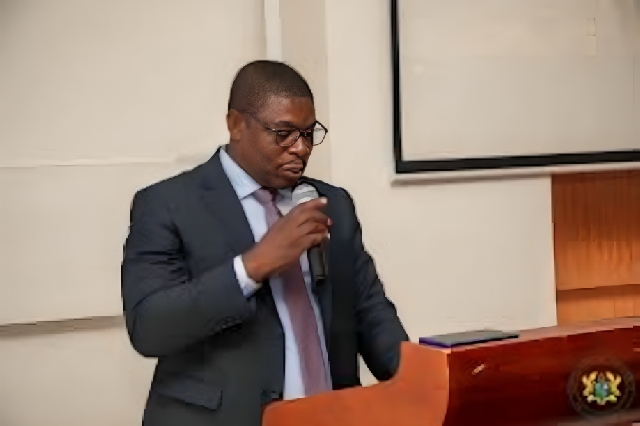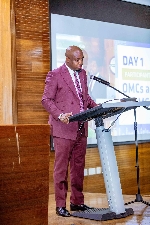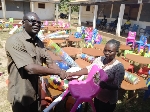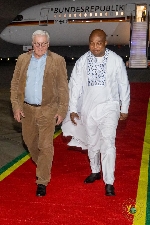Sod cut for 200-megawatt solar power plant at the Dawa Industrial Enclave
 Deputy Minister for Energy Richard Gyan Mensah
Deputy Minister for Energy Richard Gyan Mensah
The Deputy Minister for Energy, Richard Gyan Mensah, has described the construction of a 200-megawatt solar power plant at the Dawa Industrial Enclave as a landmark step in Ghana’s transition to clean and sustainable energy.
Speaking at the sod-cutting ceremony on behalf of the Minister for Energy and Green Transition, Hon. John Abdulai Jinapor, the Deputy Minister said the project underscores government’s strong commitment to diversifying the national energy mix, reducing carbon emissions, and ensuring universal access to reliable, affordable, and clean energy.
“Under the leadership of His Excellency, the Ministry of Energy and Green Transition has prioritised renewable energy as a central pillar of our national energy strategy,” he said. “This event is not just the beginning of an infrastructure project—it is a collective statement of our commitment to Ghana’s energy transition and industrial transformation.”
Mr. Gyan Mensah noted that the 200MW solar farm, which is expected to be scaled up to 1,000MW, represents one of the largest renewable energy investments in Ghana’s history. Strategically located within the Dawa Industrial Zone, the project will serve as a dedicated clean power source for manufacturing and export-oriented enterprises.
He emphasised that integrating renewable energy directly into industrial enclaves demonstrates how green energy can drive industrial growth, job creation, and climate action, which are the three pillars of Ghana’s energy and green transition strategy.
When completed, the facility will supply affordable and reliable power to industries, reduce grid stress, and contribute significantly to Ghana’s goal of achieving at least 10 percent renewable energy in its national mix in the medium term.
The Deputy Minister also commended the Dawa Industrial Zone for offering a 10 percent reduction in electricity tariffs for companies that operate within the enclave, describing it as an incentive that promotes green industrialisation.
He announced that the Ministry is finalising the Renewable Energy Master Plan (2026–2030) and developing a five-year strategic framework to accelerate implementation, promote accountability, and strengthen investment in renewables.
“Our roadmap guides us towards net-zero emissions by 2070 while safeguarding energy security and economic growth,” he said. “This will be achieved through strong public-private collaboration, and we welcome the IFC, pension funds, and other stakeholders to help mobilise resources for this initiative.”
Mr. Gyan Mensah revealed plans to establish a Renewable Energy Authority to ensure the sector’s effective contribution to government’s Big Push Agenda. He added that since industry currently accounts for 42 percent of total electricity consumption, clean energy solutions are not just an environmental necessity but an economic imperative.
Ghana’s total installed electricity generation capacity stands at about 5,749MW, with renewables (excluding large hydro) contributing roughly five percent (270MW). Government aims to double this share to 10 percent by 2030, and the SFI Dawa Solar Project will play a key role in achieving that target.
The Deputy Minister expressed appreciation to all partners, investors, engineers, and stakeholders involved in the project, including SFI, the Dawa Industrial Zone, the Energy Commission, and the Electricity Company of Ghana.
“As we cut the sod today, we mark the beginning of a new chapter in Ghana’s industrial and energy journey—a chapter powered by innovation, sustainability, and shared prosperity,” he concluded. “Let this solar farm stand as a beacon of Ghana’s green industrial revolution.”
Source: classfmonline.com/Pearl Ollennu
Trending News

NPP race: Dr Adutwum embarks on ‘Hope Tour’ in Ahafo to inspire party unity and growth
16:40
NDC Legal Director defends use of co-accused as prosecution witness in trial
13:50
Bryan Acheampong adopts Volta Region NPP, pledges new future of hope, unity and growth
09:39
Lightwave E-Healthcare refutes Health Minister’s claims over National E-Health System
09:18
NSMQ 2025: Mfantsipim rises to semi-finals, edging out Prempeh and Adisco
22:24
A/R: Santasi China Mall goes up in flames
18:50
State funeral announced for former First Lady Nana Konadu Agyeman-Rawlings
17:10
Margins ID Group marks Cyber Security Month with awareness workshop on data protection
13:00
Dr. Apaak donates GHS 70,745 worth of learning materials to support 8 KG schools
09:26
German President Frank-Walter Steinmeier in Ghana, see his itinerary here
01:33



